OFF THE SHELF: APRIL 2023

OFF THE SHELF: APRIL 2023
A huge publishing month as Spring beckons – Shakespeare’s First Folio celebrated, a majestic biography of an Oxford philosopher and an intricate look at koalas
Published: 1 April 2023
Author: Richard Lofthouse
Share this article
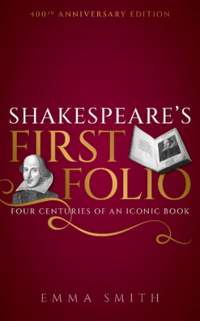
Shakespeare’s First Folio: Four Centuries of an Iconic Book by Emma Smith (Oxford University Press, 13 April 2023)
When OUP sent us a press release boasting of Shakespeare’s First Folio, 400th Anniversary edition, with ‘a new Preface by the author’ I thought that either there was a mistake or that something truly miraculous had happened. But the book in question is a reception history in a special anniversary edition, by Emma Smith, Professor of Shakespeare Studies at Hertford College. The best way to think of it is as book biography: the book in question being the first collected edition of Shakespeare's plays printed in 1623 and known as the First Folio. Emma begins with the story of its first purchaser in London in December 1623, and goes on to explore the ways people have interacted with this iconic book over the four hundred years of its history.
The author reanimates, in narrative style, the histories of this book, paying close attention to the details of individual copies now located around the world - their bindings, marginalia, general condition, sales history, and location - to discuss five major themes: owning, reading, decoding, performing, and perfecting. A perfect way to begin a year of celebration culminating on November 8, the recognised publication date of the first First Folio in 1623, seven years after Shakespeare’s death and the start of the consolidation of his greatness.
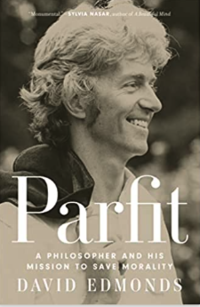
Parfit: A Philosopher and his Mission to Save Morality by David Edmonds (Princeton University Press, 18 April, 2023)
The author here should be congratulated. This is a fabulously absorbing and wholly necessary biography of a significant Oxford academic who a lot of people have sort of heard of but can’t quite place: Derek Parfit (1942-2017) (Balliol, 1961), or as Edmonds offers, ‘the most famous philosopher most people have never heard of.’ He manages to write a sympathetic yet honest character study while also providing some insight and guidance into Parfit’s thinking but not to the point of going off a cliff into specialised knowledge. If you have any interest in ideas there is plenty of catnip here. If you think that moral philosophy is your guide to how to live well, then the book is indispensable, at least as a gateway to further inquiry. Parfit was also an incredibly talented photographer, and we have written about him and shared some of the resulting images he took of Oxford in a dedicated feature.
I suspect there will be other, less sympathetic reactions to Parfit based purely on what is offered here. He drove his editorial team at Oxford University Press to despair; he was careless about other people in person in ways that nonplussed many with whom he might have already had very intense written exchanges about philosophical points. He was socially awkward to a high degree. He may have had mild autism, although thankfully that matter is left right until the end so it doesn't overshadow the man and his life and thought. Suffice to say, All Souls offered Parfit significant shelter from administrative and teaching responsibilities. It is a wide open question, whether this was on balance good or bad. Perhaps ultimately it was a mixed blessing, allowing him to devote himself maniacally to his work but at the price of overall well being, particularly as the years ticked by.
Like Parfit’s first, defining contribution to philosophy, Reasons and Persons (Oxford University Press, 1984), I think Edmonds’ biography will find a wider audience than expected and it deserves to. The verdict on Parfit’s contribution to philosophy is much harder to assess if you aren’t a professional philosopher, and in truth it's far too early to say. But the debate has been made more accessible to a broader audience in the hands of David Edmonds, who is both a philosopher and an exceptional communicator of difficult ideas.
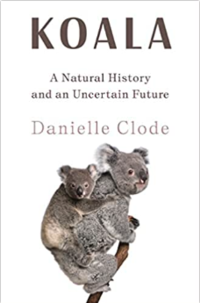
Koala: A natural history and uncertain future, by Danielle Clode (Norton & Norton, 7 March 2023 (UK release)
Celebrated Australian biologist and Professor at Flinders University, Danielle Clode (Balliol, 1990) has previously authored a dozen books, broadly but not exclusively devoted to aspects of Australian natural history. Here she turns her curiosity towards a species that it took Europeans a decade to even notice, and a further two to classify, even while it is one of the most popular ‘animal species’ in the imagination of the general public, second only perhaps to panda bears and lions.
Clode admits that koalas were so familiar to her, as an Australian, that she was in danger of taking them for granted. It was only when a bushfire threatened that she truly paid them attention. She soon realized how much she had to learn about these complex and mysterious animals.
She embarks on a delightful and surprising journey through evolutionary biology, natural history and ecology to understand where these enigmatic animals came from and what their future may hold. She begins her search with the fossils of ancient giant koalas, delving into why the modern koala has become the lone survivor of a once-diverse family of uniquely Australian marsupials. Koala investigates the remarkable physiology of these charismatic creatures. Born the size of tiny 'jellybeans,' joeys face an uphill battle, from crawling into their mother’s pouch to being weaned onto a toxic diet of gum-tree leaves, the koalas’ single source of food.
Clode explores the complex relationship and unexpected connections between this endearing species and humans. She explains how koalas are simultaneously threatened with extinction in some areas due to disease, climate change and increasing wildfires, while overpopulating forests in other parts of the country. Deeply researched and filled with wonder, Koala is both a tender and inquisitive paean to a species unlike any other and a call to ensure its survival.
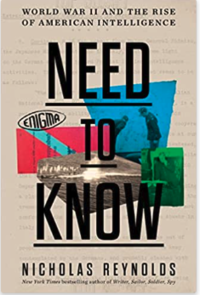
World War II and the Rise of American Intelligence by Nicholas Reynolds (Harper Collins, 2022)
Historian, former CIA officer and alumnus Nicholas Reynolds (Trinity, 1971) has written across a vast terrain here to tell the story of the American secret services, from birth to adolescence. The midwife was World War II and without it history would have been different, an obvious yet typically misunderstood point. Prior to 1940 the US had no organisation to recruit spies or launch covert campaigns against enemies overseas. By the time the bomb was dropped over Hiroshima, there was a fully-fledged apparatus that carried over into the Cold War and beyond. The narratives told here are peopled by fascinating characters who all had their work cut out at an extremely difficult moment in human affairs. One person has to spend fifteen hours wedged in a bomb rack to fly from New York to Scotland; another is a former bullfighter. One sequence begins with the words: ‘This strange scenario…’ But many more could be described thus, and collectively they add up to a dazzling array of human behaviour and resourcefulness. Different individuals are devious, daring, reckless, inventive, brilliant, foolhardy and courageous. Sometimes it seems, all at once or in short succession. Yet there is an index, a long list of primary sources from the Central Intelligence Agency, the Department of State, the Federal Bureau of Investigation and the Library of Congress. The selection of photographs is exemplary, bringing the war to life and showing wartime London as ‘usually inviting to Americans from 1940 on’, compared to Moscow, ‘a grim and uninviting destination in 1943’. In short this is history at its best, being ground breaking, well written and scholarly, regrettably still a surprisingly rare combination.
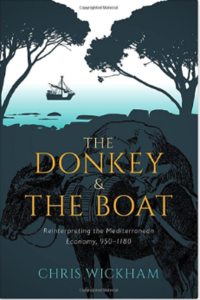
The Donkey and the Boat: Reinterpreting the Mediterranean Economy, 950-1180 by Chris Wickham (Oxford University Press, 2023)
The author is Chichele Professor of Medieval History Emeritus at Oxford.
Our knowledge of the Mediterranean economy is based on syntheses which are between 50 and 150 years old; they are based on outdated assumptions and were written before there was any usable archaeology. Even today, people tend to see the great central medieval trade cycle in the Mediterranean as dominated by Italian cities and the luxury trade focused in Venice - and on great ships. In The Donkey and the Boat, Chris Wickham argues, in contrast to all previous studies, that the Mediterranean cannot be understood through the lens of long-distance shipping (‘the boat’), but, rather, through focused studies of the internal economies of each Mediterranean region (‘the donkey’). Some particularly exciting insights include: (1) Egypt was easily the most important economy of the Mediterranean, and northern Italy, far from being dominant, was rather late to develop economically; this upturns all previous views of the period. (2) The region most open to the Mediterranean was not northern Italy but Sicily. (3) The fastest-growing region of the Mediterranean across these three centuries was al-Andalus, Islamic Spain and Portugal. Wickham re-examines documentary and archaeological sources and offers an exciting new account of the Mediterranean economy in the 10th to 12th centuries forcing readers to entirely rethink the underlying logic to medieval economic systems.
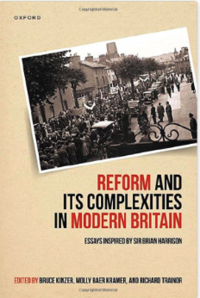
Reform and its Complexities in Modern Britain: Essays inspired by Sir Brian Harrison, edited by Bruce Kinzer, Molly Baer Kramer and Richard Trainor, (Oxford University Press, 2022)
Celebrated by his former students and fondly known for his love of puddings, Brian (St John's, 1958) was a Tutorial Fellow at Corpus from 1967-2000, leaving only to take up the Editorship of the New Dictionary of National Biography, an immense burden of work and organisation but one that Brian was entirely suited to and eventually a key reason for his ‘Sir-dom’. He keeps working in his emeritus phase, tapping out immense word counts by the day, and in a marvellous Foreword by Sir Keith Thomas, originally one of Brian’s tutors, he recounts how students would notice him continue to touch type while swivelling around to say hello as they arrived for a tutorial. In other words he eagerly embraced efficiency and once said that he would have made a civil servant had academia not nabbed him. Academic history and historians are glad that he didn’t end up in Whitehall. In this book there are essays by formers students and colleagues about pressure groups, rural reform, Protestant nonconformity, the history of the DNB, juvenile delinquency, animal welfare in Britain and women entering the House of Lords. There is even an essay on why Wales stayed in the UK and the history of professional footballers’ contracts. This festschrift is richly deserved and begins to do justice to the immense range of British social, cultural and political and constitutional themes that Brian has researched and written about ever since his first and still great book, Drink and the Victorians (1971).
Listing image by Shutterstock.
Off the Shelf typically concerns books where there is an Oxford connection, whether the place, the University or of course the author.
Alumni can claim 15% discount in any Blackwell's store with a My Oxford Card.
Alumni can claim 20% discount at Oxford University Press.
Join the Oxford Alumni Book Club at: www.alumni.ox.ac.uk/book-club















